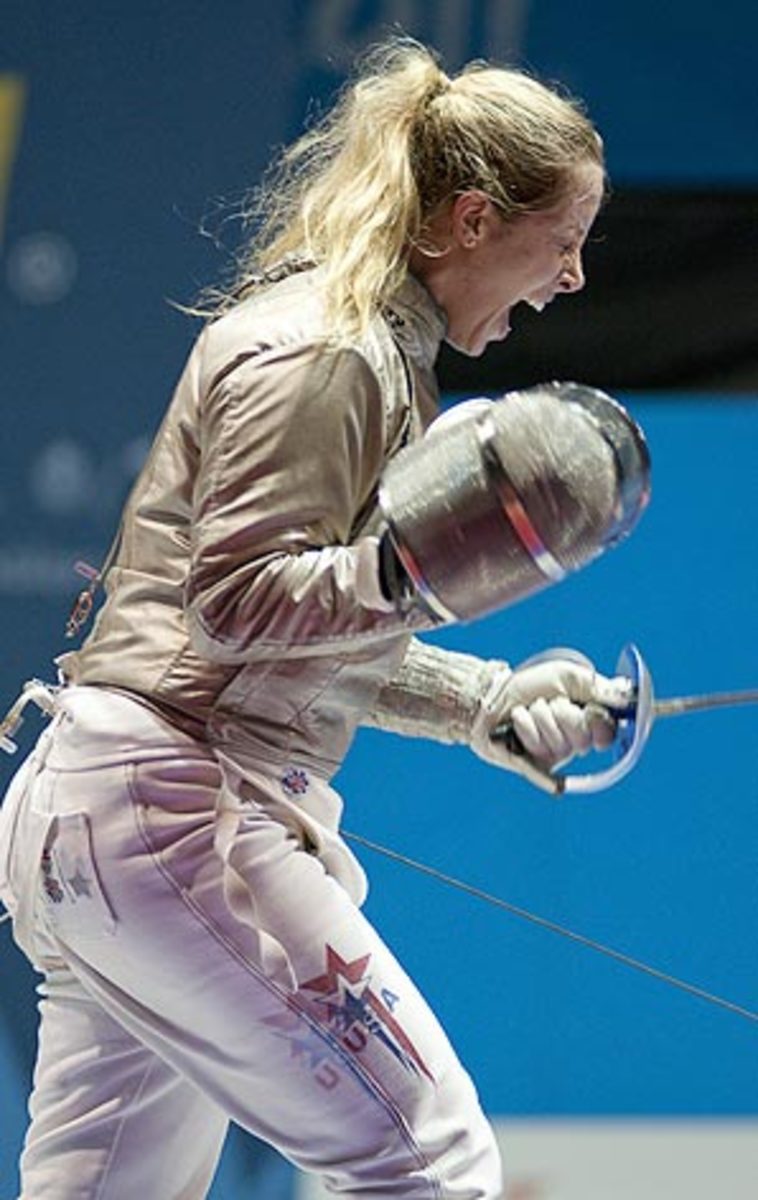Olympic fencing preview
Italy and France have produced the world's best swordsmen and swordswomen over the last decade, but the U.S. developed into a threat in the last two Games, winning two medals in 2004 (its first since 1984) and six in 2008 (second only to Italy). The fencing event program was changed for the fourth straight Olympics, but it's still three individual events each for men and women, two men's team events and two women's team events -- so, 10 events overall.
SPORTS EXPLAINERS: FENCING
For London, out went the men's team épée and women's team saber (big blows for the U.S.). In came the men's team foil and women's team épée.
Mariel Zagunis, U.S.: If you can name one fencer, it's probably Zagunis, 27, the two-time defending Olympic champion in women's saber, which was introduced at the 2004 Olympics (where she became the first U.S. Olympic fencing champion in 100 years). She owns three of the seven medals the U.S. has won in women's fencing since its introduction in 1924 and, with another in London, will become the first U.S. woman to win four Olympic fencing medals. It'd be a surprise if she didn't. Zagunis medaled at the three world championships (gold-gold-silver) between the 2008 and 2012 Olympics and is ranked No. 1 in the world.
Valentina Vezzali, Italy: Vezzali, the foil queen, has Zagunis beat handily. She's won three straight individual Olympic golds and boasts seven medals overall dating back to the 1996 Olympics. She's back, at 38, with a chance to become the most medaled female fencer of all time (one more to tie, two to hold it herself). Like Zagunis, she's a favorite. Vezzali, the Italian flag bearer, won individual gold and team silver at the 2011 world championships.
Nikolai Novosjolov, Estonia: The former Soviet republic has won three gold medals since re-entering Olympic competition in 1992 and zero medals of any color in fencing. Novosjolov, the 2010 world champion and world No. 1 in men's épée, is the only Estonian man ranked in the top 100 in the world in any fencing discipline. Not surprisingly, Estonia qualified just one fencer for the Olympics. Novosjolov has shot up the rankings since placing 30th in Beijing.
The U.S. was the only nation to qualify the maximum number of fencers for the Games -- 16. That would seem to bode well when combined with its recent Olympic surge. But, recent world championships tell a different story. The U.S. hasn't won more than two medals in Olympic disciplines at the three world championships since its six-medal haul in Beijing. Zagunis was the only U.S. fencer to win anything other than a tie for bronze at those worlds. The U.S. is the top-ranked men's épée team and the 2008 bronze medalists in women's team saber, but neither of those events will be contested in London. That leaves Race Imboden, 19, ranked fifth in men's foil last year, and Lee Kiefer, 18, ranked fifth in women's foil, as the only U.S. fencers other than Zagunis in the world top five.
Zagunis vs. Sophia Velikaia
Zagunis was denied a world threepeat in 2011 by the Russian, who came back from 12-5 down to win 15-14. The final was controversial. "Many who watched ... wondered if the Romanian referee had been trying to curry favor with Alisher Usmanov, the Russian billionaire who is president of the International Fencing Federation," reported Phil Hersh of the Chicago Tribune in this excellent profile on Zagunis. Zagunis and Velikaia are ranked Nos. 1 and 2.
Italian men vs. the world
Italy swept the men's épée, foil and saber golds at the 2011 world championships with home strip advantage in Catania (but somehow managed just one bronze in team competitions). Nowhere was the dominance more evident than in foil, where Italy went 1-2-3 with the top three ranked swordsmen. China's Ma Jianfei and America's Imboden will try to shake up the podium this time around.
The U.S. has medaled in every Olympic discipline except women's épée. But that drought could end in London. The women's épée team will be ranked fifth going into the Games, coming off a World Cup silver earlier in the year and a fourth at the most recent World Cup in Leipzig, Germany, where they dropped two medal-round matches by just one touch in overtime. Kelley Hurley, an Olympic replacement athlete (similar to an alternate), boosted her American teammates' individual hopes by ousting the world No. 1 in Leipzig.
U.S. foil teammates Miles Chamley-Watson and Imboden have British ties. Chamley-Watson holds dual British-American citizenship and was born in London, while Imboden's mother is British. ... Fencing is one of four sports to be held at every modern Olympics (joining wrestling, track and field, swimming). ... The late Edoardo Mangiarotti of Italy was once the most decorated Olympian of all time, winning 13 medals between 1936 and 1960 -- his last Olympics at age 41 -- competing in épée and foil. He was surpassed by Soviet gymnast Larisa Latynina in 1964 and now is tied for fourth overall.
July 28: Women's Foil
July 29: Men's Saber
July 30: Women's Épée
July 31: Men's Foil
Aug. 1: Men's Épée, Women's Saber
Aug. 2: Women's Team Foil
Aug. 3: Men's Team Saber:
Aug. 4: Women's Team Épée
Aug. 5: Men's Team Foil






